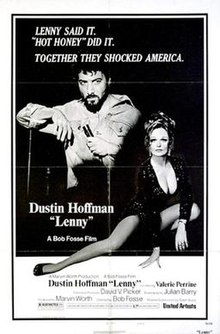Being older than most other people in this world, a claim that can be made by only some 3.8 billion others, I remember Lenny Bruce. What I knew of him came from the eponymous 1974 movie Lenny starring Dustin Hoffman and Valerie Perrine.

Since I made a point of my imperfect recollection in my last post, I'll admit to being surprised to learn (or re-learn, as the case may be) that Dustin Hoffman starred as Lenny Bruce. That came as a surprise to me when I glanced over the Wikipedia article for the movie. Then I saw that Valerie Perrine co-starred in the movie, and I was not so surprised by that. That fact seemed somehow familiar to me, though I wouldn't have thought of her name in response to a Jeopardy question. Maybe the movie poster created a few more neurons of her than of him.
But I meander.
For those not familiar with Lenny Bruce, I'll excerpt from the Wikipedia article on him.
Leonard Alfred Schneider (October 13, 1925 – August 3, 1966), better known by his stage name Lenny Bruce, was an American stand-up comedian, social critic, and satirist. He was renowned for his open, free-style and critical form of comedy which integrated satire, politics, religion, sex, and vulgarity. His 1964 conviction in an obscenity trial was followed by a posthumous pardon, the first in the history of New York state, by then-Governor George Pataki in 2003.
Bruce is renowned for paving the way for future outspoken counterculture-era comedians, and his trial for obscenity is seen as a landmark for freedom of speech in the United States. In 2017, Rolling Stone magazine ranked him third (behind disciples Richard Pryor and George Carlin) on its list of the 50 best stand-up comics of all-time.
The Wikipedia article provides a long list of cultural references to Lenny Bruce, some of which I recognize after the fact. Simon and Garfunkel incorporated him into several variations of their songs. Bob Fosse, who directed Lenny, incorporated Lenny into All that Jazz. And, my favorite, Lenny Bruce is pictured on the top row of the cover of the Beatles 1967 album Sgt. Pepper's Lonely Hearts Club Band. He's on the top row, fourth from the left, at least according to this site:

I guess that is Lenny Bruce, top row, fourth from the left. I'll provide his mug shot and let you decide for yourself.

In summary, Lenny Bruce was a comic who told dirty jokes, was convicted of obscenity for them, and thereby became famous. And with that astoundingly well-organized background out of the way, I'm ready for the cautionary tale portion of this post. I excerpt now from the Wikipedia article for Lenny.
The film jumps between various sections of Bruce's life, including scenes of when he was in his prime and the burned-out, strung-out performer who, in the twilight of his life, used his nightclub act to pour out his personal frustrations. We watch as up-and-coming Bruce courts his "Shiksa goddess", a stripper named Honey. With family responsibilities, Lenny is encouraged to do a "safe" act, but he cannot do it. Constantly in trouble for flouting obscenity laws, Lenny develops a near-messianic complex which fuels both his comedy genius and his talent for self-destruction. Worn out by a lifetime of tilting at Establishment windmills, Lenny Bruce dies of a morphine overdose in 1966.
I've emboldened two cautionary notes in the excerpt, both of which I take to heart. Dealing with the second one first, I don't want to be worn out tilting at Establishment windmills (interesting capitalization) and die of a morphine overdose in 1966. Second, I don't want to become a burned-out, strung-out blogger who uses his writing to pour out his personal frustrations.
Many of the events that have taken place over the last four years are of intense interest and importance to me, but I suspect my august readers have their own issues to fret over. I feel the urge to rapidly pour out all that has happened, but I must resist the temptation.
What I remember most from my viewing of Lenny was how he had turned his nightclub act from one of fantastic comedy in which he made fun of the human condition, to one in which he literally read from the legal documents in his case. Since I've been known to quote from a legal document or two, I see the parallel and suddenly seem one step close to dying of a morphine overdose in 1966.
Now for the happy ending.
Because of Lenny and Lenny, I realize that I should not use my return to this august blog to tell only of matters of great importance to me. I need to write more broadly, of wrongful convictions beyond my immediate interest, perhaps even of other aspects of the human condition.
That way, I might not only recover some of my readership, I might also not die of a morphine overdose in 1966.




